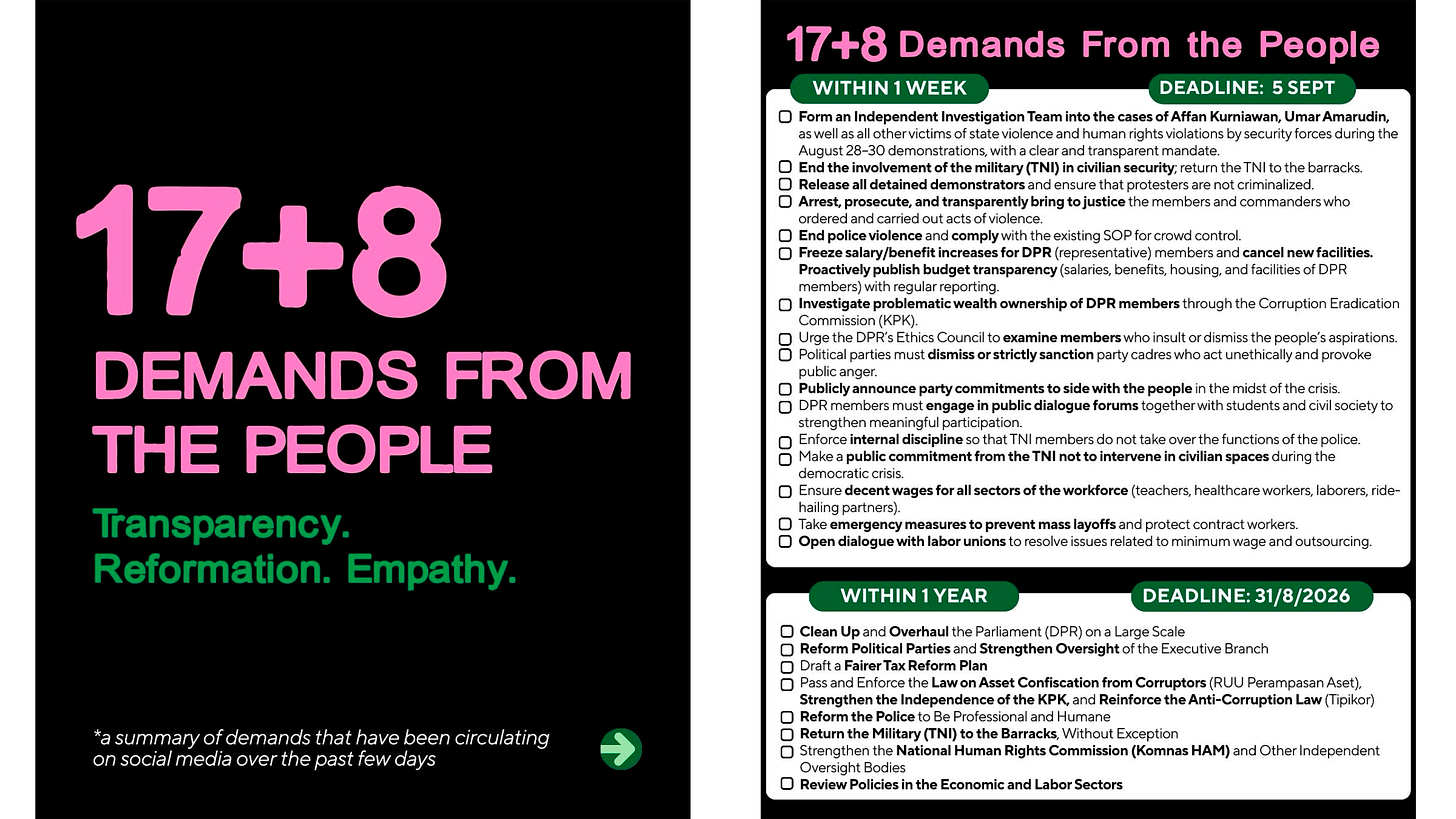Indonesia in Revolt
A popular uprising against corruption and authoritarianism surges throughout Indonesia.
Beginning with a student-led protest on the parliament building in Jakarta on August 21st, the nation of Indonesia was thrown into a popular uprising against not only the oligarchs in power but also against capitalist exploitation that is tightening its grip everywhere around the world. Popular revolt is a direct result of deteriorating conditions under a global system that must naturally extract infinite profit to stay alive. The only way to escape this cycle of deterioration and revolt is to join the international community in solidarity against the ruling class, which we also struggle against in America.
Indonesia has felt the knife of austerity sharpen in recent years as spending on authoritarian surveillance, police, and military has taken priority over social spending. This fits into the global mold of right-wing governments taking power after the failure of the liberal to social liberal wave following the global financial crisis of 2008. This particular spark was ignited by a plan to issue an Rp50 million ($3,003 USD) housing allowance for all parliamentarians. For reference, that sum is ten times the monthly minimum wage of those in Jakarta and in poorer regions of the country, upwards of twenty times. After government housing was decommissioned, this measure was instituted as compensation to lawmakers, but it ultimately served as an alarm bell, signaling to the people just how disconnected and corrupt these elites were.
Combine this with the effects of inflation, rising living costs, mass layoffs, and falling real wages, and anger boiled over for young Indonesians. Much like people experiencing declining living standards throughout the world, young people in Indonesia face a bleak future ahead in the face of climate disaster and economic stagnation. These protests come after decades of capitalist influence effectively owning the state, while the military encroaches further and further into the people’s lives.
State repression in Indonesia begins with the right-wing military coup in 1965 when Indonesia’s President Sukarno distanced himself from the military and sides with the Indonesian Communist Party (PKI). The United States during this time is covertly using the CIA to financially back, arm, and train the Indonesian military against the will of the President. On September 30th, the communist militias strike first in anticipation of a coup and are quickly crushed by the military who seize power under General Suharto. Over the next year, the military launched a violent purge against suspected communists across the country. An estimated 500,000 to 1 million people were murdered, and many more imprisoned in a mass killing that many academics consider to be a genocide.
Since the Reformasi Movement toppled the Suharto dictatorship in 1998, some civil liberties have been restored, elections have been instituted, and new parties have been legalized. However, the wealth and influence of oligarchs from the old regime remained, and no serious redistribution occurred. All the previous methods of control were repackaged into neoliberal institutions, parallel with the global trend. The military elites became nationalist figures, including the origin of the current President Prabowo Subianto, who was a general during the dictatorship and son-in-law of Suharto. Though reform has been promised over the last three decades, authoritarianism has only been entrenched and extraction normalized under a new neoliberal mask.
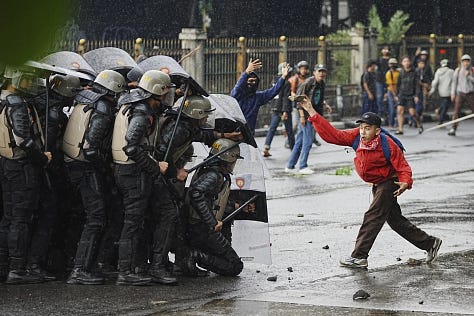
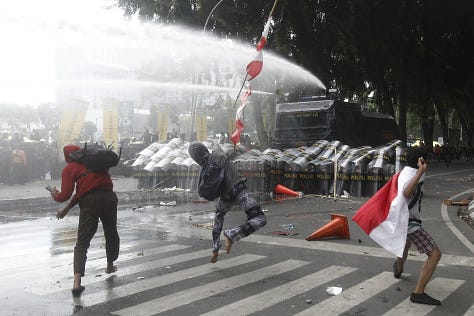
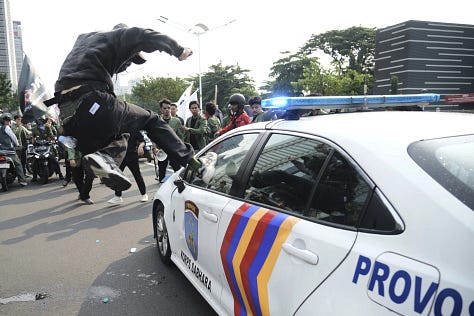
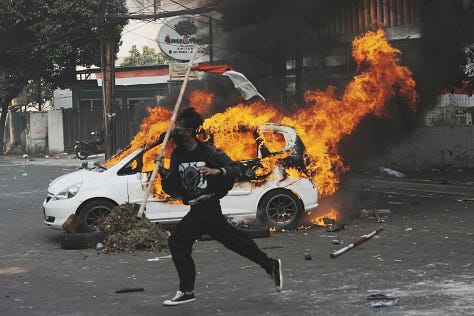
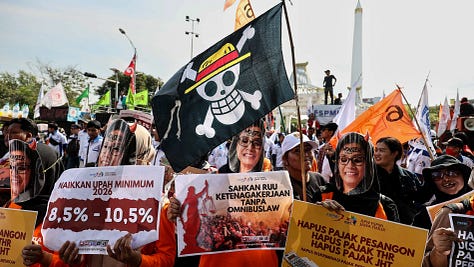
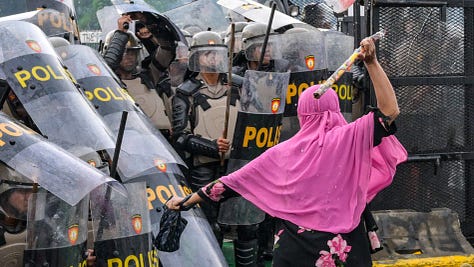
Protests emerged across the country throughout the week after the Jakarta protest. On August 27th in Sorong City, riots broke out, and 12 people were arrested as the temperature began rising in the country. The following day, on August 28th in Jakarta, clashes between the military and protesters erupted with tear gas and water cannons. The fight spilled over into the night as the military increased its force. A viral video was captured of an armored paramilitary vehicle running over and killing Affan Kurniawan, a 21-year-old taxi driver. Outrage exploded into Makassar, Surabaya, Bandung, Bali, Medan, and more the next day as people fearlessly fought police with firecrackers, molotovs, rocks, and sticks. Government buildings and police facilities were burned, most notably the West Java provincial government building, the regional congress building in Kediri, and the Makassar City parliament building, which killed three people. With riots continuing in the following days, the houses of MPs were looted, along with Finance Minister Sri Mulyani’s home being raided.
The response from the state was to increase police and military presence, crack down by arresting individual protestors, and front like they would grant concessions. The first among them was to cancel overseas trips and roll back housing allowances, but protestors stood firm while the rupiah fell and investors recoiled.
Characteristically, this movement was a popular response to state overreach and began at the grassroots level with student groups, labor unions, and specifically motorcycle taxi and delivery drivers leading the way. The movement coalesced around the “17+8 Demands,” a list of seventeen immediate demands and eight more long-term measures to implement in government, published by social media influencer Jerome Poline Sijabat and civil society groups. The demands were a unifying framework to address the pay raises, which started the uprising, the cost of living crisis, police brutality, corruption, oligarchy, and state repression. Many of these measures came out of the banners calling to “Dissolve DPR,” and chants at the protests. A notable unifying force throughout the anti-government movement has been the jolly roger flag from the Japanese anime One Piece, which represents popular resistance against corrupt elites. The flag has been used both as a symbol of defiance and as a scapegoat for politicians to justify crackdowns, with some local municipalities even banning it or using police to intimidate those who fly it.
Thus far, the government has agreed to create a Labor Welfare Council and a Layoff Prevention Task Force to address the economic demands of workers. Then, on September 5th, the parliament issued a 6-point plan to address the unrest. The parliamentarians agreed to roll back all their housing allowances, stop all overseas vacations, reduce all transportation and service allowances, stop all benefits for expelled MPs, enhance financial transparency, and ‘increase meaningful public participation in the legislative process.’ That statement also said that five MPs will be ‘inactivated’ for ‘causing controversy’ and that they will not recieve benefits while an ethics council investigates their actions. The most significant reform is a stimulus package worth Rp 16.23 trillion ($989 million USD), which includes a “food assistance and an infrastructure building programme that could provide temporary work for more than 600,000 people.” Despite these moves, the government’s strategy is clearly to prioritize economic growth over creating a more equitable workforce. They believe that if they just increase the size of the pie, they can satisfy the people rather than cutting it up more evenly.
Most damning is how the government has taken almost no responsibility for the violence it committed on its own people. Human Rights Watch reported that over 3,000 protestors have been jailed, while no accountability has been handed to the violent officers and soldiers. As of September 16th, at least 400 people remain in jail while thousands were injured in the state crackdowns. According to The Commission for Missing Persons and Victims of Violence (Kontras), they “identified 33 people who were victims of alleged enforced disappearances.” The people disappeared are not legally detained; they are held with no access to the outside world that a normal arrest would grant a person. The police hide where the detainees are being held from the public, while their extralegal detainment means they can be tortured with no recourse. One man named Didik, who was released after being disappeared, had “injuries including a puncture wound to the head, a wound on the forehead, a wound on the temple, wounds on his right and left knees, and his back.” The government has yet to address any of the demands related to repression.
While the state has promised some reforms, ultimately, most of the demands have gone unanswered. But this isn’t for no reason. As Indonesian socialists like Surya Antain have articulated, the increasing militarism is directly connected to imperialism. It is not just domestic mismanagement; it’s connected to the global capitalist system, where Indonesia, along with the rest of the global south, is subservient to the West through debt payments, foreign investment, cheap labor exploitation, and resource extraction. Oppressive ‘liberal’ governments like the one in Indonesia are not random; they are a product of a system where Western nations force the worst symptoms of economic crises onto the global south. Thus, these governments, rather than redistributing wealth and power, naturally squeeze their populations to maintain the infinite growth trajectory of capital. When Samsung, mining multinationals, Nike, and Adidas experience slowing productivity, cost-cutting begins with the garment factories in Surabaya, miners in Sulawesi, and manufacturing plants in Jakarta. When capitalist elites see the writing on the wall, they don’t hand over power willingly; they increase militarism, increase police presence, and tighten control on their populations through surveillance, which is exactly what we see happening in Indonesia.
As Indonesians strive for concessions and a more equitable society, history has proven that only a complete system change, that is, handing the means of production to the people through revolution, is the only way to overcome the crisis of capitalism. To delay this historical process of transition from capitalism to socialism is, unfortunately, only going to lead to more misery. Reform in the past has proven insufficient; state crackdowns have reemerged, wealth inequality has only widened, and climate disasters have only grown closer. As Rosa Luxemburg said over a hundred years ago, it is ‘socialism or barbarism.’ But in today’s age, of mega data centers, car dependency, and mass deforestation cooking our planet alive, we cannot survive anymore barbarism; we ought to say ‘socialism or extinction.’ There is no other option than revolution to reclaim the state for the people, abolish economic classes, and build a world that works for the benefit of all and not the few.
As people of the working class, we must stand in solidarity with Indonesians and amplify their struggle. American capitalism is not just barbaric domestically; its imperial abuses span across every corner of the globe.




